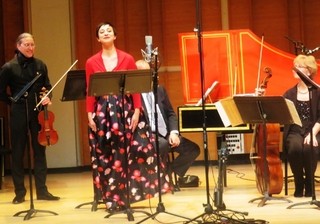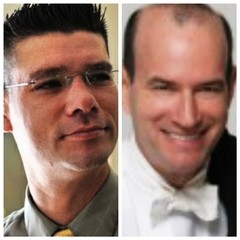|
Back
A Mighty Radiance Were Their Songs New York
Merkin Concert Hall
03/13/2017 -
“Three Views on Bach”
Alessandro Scarlatti: Su le sponde
Johann Sebastian Bach: Concerto for Harpsichord No. 1 in D Minor, BWV 1052: Adagio – Cantata “Jauchzet Gott in allen Landen”, BWV 51
Antonio Vivaldi: Concerto for Cello and Strings, RV 401
Josh Cohen (Trumpet)
Four Nations Ensemble: Pascale Beaudin (Soprano), Oliver Brault, Tatiana Chulochnikova (Violins), Henry Valoris (Viola), Loretta O’Sullivan (Cello), Andrew Appel (Harpsichord, Musical Director)

O. Brault, P. Beaudin, L. O’Sullivan (© Samuel T. Dog)
“Bach almost persuades me to be a Christian.”
Roger Fry, quoted in the biography Roger Fry
And last night, toward the end of Bach’s cantata, Rejoice in God in Every Land, that rapturous soprano Pascale Beaudin singing the final chorale, “Glory, and praise with honor”, step by step, bit by bit began the Lutheran hymn, A Mighty Fortress Is Our God, like an organic creation of the Lord Himself, praising Himself with that tune of glory.
And for an unconscious moment, I thought to myself, “Perhaps that vicious anti-Semitic braggadocio Martin Luther could be the answer...”
That thought, obviously, evaporated, as Baroque trumpet-player Josh Cohen and the four other string members, joined Ms. Beaudin for a final “Allelujah”, which–like most religious music–easily transcends the tenets of religion itself.
This was a shortened concert by The Four Nations ensemble, which has performed “early music” (a phrase as misleading as “classical music”) for 31 years. Perhaps their ensemble members have changed (most of the players look far younger than three decades), but their founder, leader and harpsichordist, Andrew Appel, has the most beautiful touch on his instrument, and his leadership–albeit with some problems–was as beatific as his programs.
His instrument looked modern, but was obviously based on an earlier model, the beautiful mahogany finish a fine centerpiece for his ensemble. Nor did the sounds resemble the usual clangs harpsichordists. (Sir Thomas Beecham, I believe, compared it to two cats fighting on a tin roof). His tones were mellow, quite the opposite of clangor. And in the one movement of Bach’s D Minor Concerto, the Adagio was offered less like a harpsichord than an augmented lute.
Adding to that, instead of our usual abbreviated string orchestra, Mr. Appel had a mere two violins, one viola, a cello and a violone, an early double-bass. Thus no problems of balance occurred during the evening.
There were certainly problems of synchroneity. During the Bach and the earlier Scarlatti cantata, the strings and vocalist were frequently out of touch. While initially unnerving, Ms. Beaudin’s soprano gave off such radiance–whether in the low emotional recitatives of the Scarlatti or the high C which she easily reached in the Bach–that one really didn’t care.
No, this wouldn’t have made the grade in one of the Four Nations recordings, but for an eerie pre-blizzard evening at Merkin Hall, Ms. Beaudin’s voice gave a glow which precluded simple criticisms.

J. Cohen/A. Appel (© Courtesy of the Artist/Arts Journal Blog)
The guest of Four Nations was the noted Baroque trumpeter (trumpet player?) (not thank heaven, a Trump player) Josh Cohen. I think was the tromba da trirarsi, resembling a slide trombone.
If one was looking for the clarion calls of Bach’s C Major Trumpet, this was the wrong instrument. The tone was relatively low, fairly brassy, and Mr. Cohen played it with utmost accuracy. This was especially true in the Scarlatti cantata, one of the usual libretti, with the usual shepherd moaning and groaning–quite melodically–about a lost love.
Yet here, in the first aria, Mr. Cohen and Ms. Beaudin were given the most difficult tasks. Both vocal and instrumental voices imitated other in melismas, in operatic-style duets, in fascinating challenges.
The other soloist of the evening, Loretta O’Sullivan, played a Vivaldi Cello Concerto RV 401, one of about 30 concerti written by the Venetian master. Ms. O’Sullivan’s cello hardly has the resonance of our modern instruments, yet within these auburn-dark tones, she performed near miracles. At first part of the tiny ensemble, then far more complex, Ms. O’Sullivan playing triplets, then 16th notes, and 32nd notes, which must have been quite a chore for the 18th Century virtuoso.
We had no intermission here, nor was one needed. Ms. Appel’s Four Nations Ensemble provided the audience with a variety of colors, meditations and stylistic divergence. The concert was called “Three Views on Bach”, since Vivaldi and Scarlatti were extolled by the German, as his organ playing was praised by the Italian masters. Yet it was old Bach himself, with that solo cantata and its interpolation of the Lutheran Hymn which was so striking.
Mr. Appel’s showed his scholarship with an enlightening introduction, but that work, from the world’s greatest un-romantic old organ-grinder, produced measures both halcyon and gorgeous.
Harry Rolnick
|